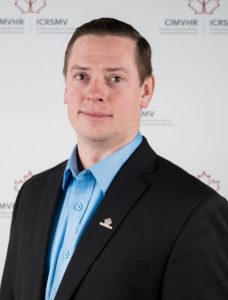by Nicholas Held, PhD
Podcasting is recognized as an interactive forum that brings together communities of people from diverse backgrounds (Harter, 2019). These may include researchers, professionals, families, the public, as well as interested partners from industry, academia, government, and the non-profit sector.
In health research, in particular, the way people access and engage in online health information is changing. Knowledge translation is a key to that change process. Podcasting serves as a strategic tool for researchers to share scientific work in ways that facilitate a high level of user engagement (Tsulukidze et al., 2023). Over the past 10 years, the use of podcasting in health education has more than doubled (Okonski et al., 2022).
Examination into the pedagogy of podcasting found its educational merit is intrinsically tied to the unique way listeners are invited into a multi-sensory space for critical thought and self-reflection. In her work on storytelling in acoustic spaces, Harter (2019) discusses the rise and history of podcasts. She attributes the popularity and usefulness of podcasting as a teaching tool that “stretches the tendencies and capacities of academics toward multi-sensorial forms of inquiry” (p. 3).
From a practical perspective, podcasts make research accessible. In the military and Veteran family communities, this is important. Military life can be unpredictable. Short notice schedule changes and frequent relocations can make it difficult for families to access consistent resources. Podcasts offer flexibility, allowing family members to listen, at their convenience, to health research information related to military family life.
To celebrate a special edition of the Journal of Military, Veteran and Family Health focused on military, Veteran and public safety personnel families, the Canadian Institute for Military and Veteran Health Research is pleased to announce the launch of the Beyond the Battlefield podcast series. This six-episode podcast series will include conversations with some of the world’s brightest researchers in military family health. Topics include:
- Lifestyle dimensions, family identity, and the history and future of family research. Invited guests Dr. Heidi Cramm and Prof. Nicola Fear.
- Stories of adult children of military parents, care experiences, and support services. Invited guests Drs. Deborah Norris and Linna Tam-Seto.
- Impact of service life on families, moral distress in family members, and help-seeking. Invited guests Laryssa Lamrock and Dr. Sharon Lawn.
- Family programs and services and the emotional and practical support needs of family care partners. Invited guests Drs. Dannielle Post and Marg Rogers.
- Community building, networks, fitting in, and roles and responsibilities. Invited guests Drs. Rachael Gribble and Nathalie Reid.
- Underrepresented/marginalized groups, reservist family well-being, LGBTQ2IA+ perspective, and transition support. Invited guests Dr. Vince Connelly and Ashley Ibbotson.
For more information about the Canadian Institute for Military and Veteran Health Research’s exciting podcast series focused on military families, please tune in to Beyond the Battlefield at https://jmvfh.utpjournals.press/beyond-the-battlefield-podcast
The Canadian Institute for Military and Veteran Health Research enhances the lives of Canadian military personnel, Veterans, and their families by harnessing the national capacity for research. The health and well-being of Canadian military personnel, Veterans, and their families are maximized through world-class research resulting in evidence-informed practices, policies and programs.
Dr. Nicholas Held, PhD, is the Assistant Scientific Director of the Canadian Institute for Military and Veteran Health Research (CIMVHR) and Deputy Editor-in-Chief for the Journal of Military, Veteran, Family Health. He is also an Assistant Professor in the Department of Psychiatry and Behavioural Neurosciences at McMaster University and is the host of the inaugural season of the Beyond the Battlefield podcast.
Prior to joining CIMVHR, Dr. Held worked as an Assistant Professor in the Schools of Kinesiology and Rehabilitation Therapy at Queen’s University. He completed his PhD at the University of British Columbia and Postdoctoral training at Queen’s University. Dr. Held’s research interests broadly focus on improving the wellbeing of military and Veterans, with a specific interest in improving pain management and recovery of Canadian Armed Forces Veterans.
Our analysis of Vista20 demonstrates something I love about theatre and participatory dramaturgies: their capacity to uniquely make us reconsider our shared experiences.
 DR. NICHOLAS HELD, PhD, is the Assistant Scientific Director of the Canadian Institute for Military and Veteran Health Research (CIMVHR) and Deputy Editor-in-Chief for the Journal of Military, Veteran, Family Health. He is also an Assistant Professor in the Department of Psychiatry and Behavioural Neurosciences at McMaster University and is the host of the inaugural season of the Beyond the Battlefield podcast.
DR. NICHOLAS HELD, PhD, is the Assistant Scientific Director of the Canadian Institute for Military and Veteran Health Research (CIMVHR) and Deputy Editor-in-Chief for the Journal of Military, Veteran, Family Health. He is also an Assistant Professor in the Department of Psychiatry and Behavioural Neurosciences at McMaster University and is the host of the inaugural season of the Beyond the Battlefield podcast.
Prior to joining CIMVHR, Dr. Held worked as an Assistant Professor in the Schools of Kinesiology and Rehabilitation Therapy at Queen’s University. He completed his PhD at the University of British Columbia and Postdoctoral training at Queen’s University. Dr. Held’s research interests broadly focus on improving the wellbeing of military and Veterans, with a specific interest in improving pain management and recovery of Canadian Armed Forces Veterans.
Comments on this entry are closed.